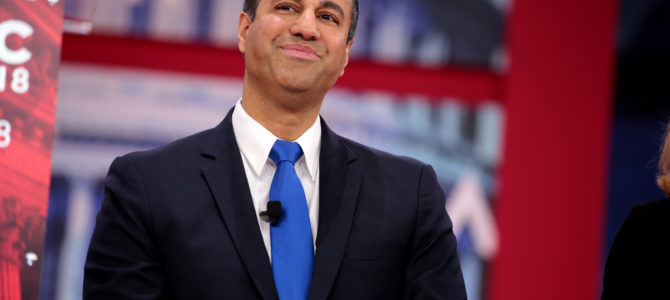The Federal Communications Commission on Thursday announced it will be evaluating the interpretation of Section 230 of the Communications Decency Act and how it is applied.
“The Commission’s General Counsel has informed me that the FCC has the legal authority to interpret Section 230. Consistent with this advice, I intend to move forward with a rulemaking to clarify its meaning,” FCC Chairman Ajit Pai said in a statement.
While Pai said that “many advance an overly broad interpretation that in some cases shields social media companies from consumer protection laws in a way that has no basis in the text of Section 230,” the implied recent actions by the social media companies are not covered by the First Amendment.
“Throughout my tenure at the Federal Communications Commission, I have favored regulatory parity, transparency, and free expression. Social media companies have a First Amendment right to free speech. But they do not have a First Amendment right to a special immunity denied to other media outlets, such as newspapers and broadcasters,” he said.
The FCC announcement follows more than 24 hours of limited distribution and censorship by Facebook and Twitter of the New York Post’s bombshell article detailing Hunter Biden’s foreign business dealings. Despite Joe Biden’s previous denial that he knew about Hunter’s business, the emails documented by the Post show that the former vice president might have met with an adviser to the Ukrainian energy company Burisma.
According to Pai, his evaluation of Section 230 will be in congruence with the intent actions already taken by “members of all three branches of the federal government” who “have expressed serious concerns about the prevailing interpretation of the immunity set forth in Section 230 of the Communications Act.”
“There is bipartisan support in Congress to reform the law,” Pai argued. “The U.S. Department of Commerce has petitioned the Commission to ‘clarify ambiguities in section 230.’ And earlier this week, U.S. Supreme Court Justice Clarence Thomas pointed out that courts have relied upon ‘policy and purpose arguments to grant sweeping protections to Internet platforms’ that appear to go far beyond the actual text of the provision.”
Senate Republicans on Thursday also announced their intent to subpoena Twitter CEO Jack Dorsey to testify in front of the Judiciary Committee about the censorship and suspensions associated with the Post’s report.
“The Senate Judiciary Committee wants to know what the hell is going on,” Texas Sen. Ted Cruz said.









